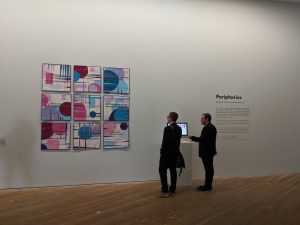
The Electronic Literature Organization Conference 2020, #ELOrlando, is coming to UCF in July 2020. Organized by Anastasia Salter and Mel Stanfill, the upcoming conference is hosted by UCF’s Texts & Technology PhD program and the College of Arts and Humanities with support from the College of Graduate Studies, Games and Interactive Media, and the Nicholson School of Communication and Media. The conference invites submissions for presentations, performances, and exhibition pieces at the annual Electronic Literature Organization Conference and Media Arts Festival (ELO), to be held July 16-19, 2020, with events downtown (both at the new UCF Downtown campus and in the city) and an exhibition at the UCF Art Gallery.
The Call for Proposals is open through December. ELO seeks proposals related to electronic literature, or e-lit–literary works in which computation forms some essential part of the aesthetic. #ELOrlando offers an opportunity to share research and creative contributions within an engaging, collegial atmosphere comprising e-lit scholars and practitioners from across the globe. The theme for this year’s conference is “(un)continuity”: participants are invited to explore fluidity and nonbinary concepts, including, re/presentation; categorization; spectra of light, sound, and the ultra/infra visible; social organization; unity; and discord.
The Electronic Literature Organization was founded in 1999, and hosts annual international conferences, most recently in Cork, Ireland (pictured). Annual conferences consist of both a peer-reviewed scientific track focused on new research in the investigation and production of born-digital literature; and a curated media arts festival with readings and performances of new juried work. Electronic Literature includes playful interactive work (such as games, augmented/virtual reality, and hybrid physical-digital installation pieces) as well as narrative experiences built to take advantage of the full potential of screens.